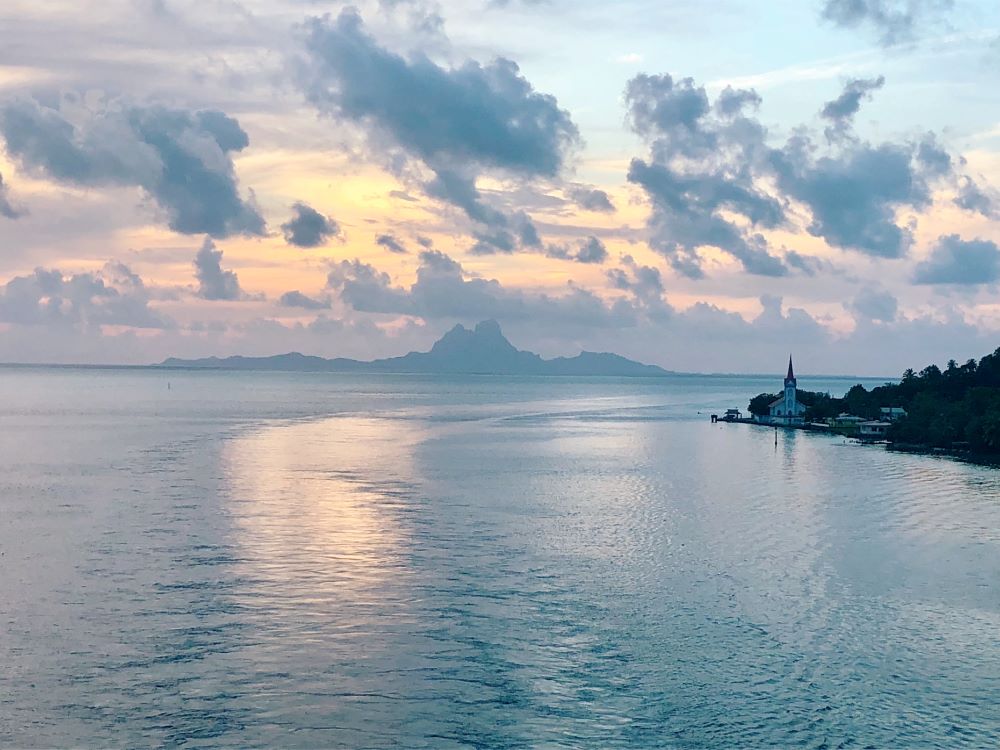
A sunset in Bora Bora, French Polynesia (Unsplash/Reiseuhu)
The Pacific Island nations may be foreign to many in the Western world, but for me, it is my paradisal home. Unfortunately, because my home feels remote, too few people realize that we are facing a potentially calamitous future.
The Pacific Island nation spans a 30,000-island chain comprising three ethnogeographic groupings: Melanesia, Micronesia, and my home, Polynesia. Melanesia's Solomon Islands are known for having the clearest waters and largest varieties of sea life in the world. The Pohnpei Islands, with their rich natural resources, are known as the "Garden of Micronesia." Then there is Tuvalu, made up of five island chains of Polynesia, where the endless fish and turtles make snorkeling the main tourist activity. As welcoming as these islands sound, over the last 30 years, global warming has been causing trouble in paradise.
Sea levels have risen two to three times the global average over the past few decades, making reef islands vulnerable to erosion and causing them to shrink. In addition, rising sea levels have caused an increase in flooding that has threatened the core food source of our nation — agriculture, creating a permeating effect on food security and the livelihood of the island natives. This is the reality our Polynesian brothers and sisters face in the islands of Tuvalu. Tuvalu has already purchased land in Fiji to evacuate their citizens as scientists have projected that the islands will most likely be underwater within the next 40 years.
The entire Pacific region contributes just 0.03% of total greenhouse gas emissions, yet millions of Pacific Islanders are subjected to the severe impacts of climate change which are an existential threat to our homeland, culture, livelihoods, and our Pacific identity. The sinking of low-lying areas has become a stark reminder and a potent symbol of climate change. Most research predicts our low-lying islands will be submerged by the end of the 21st century with some islands running out of freshwater long before they run out of land.
Advertisement
A fight to combat climate change has taken root over the past two decades in the islands. Grassroots projects have emerged to educate and advocate for our island homes and sustain the very lives of our Pacific Island people. Only when we embody the idea of "Laudato Si'," where "everything is interconnected," can we start to understand the effects of the Western world on the Pacific Island nations. Too many in the West live their daily lives with no regard for the environment around them. They consume unnecessary amounts of electricity made from burning fossil fuel, increasing air pollution, and dumping waste into the waters without understanding they have a direct and devastating effect on my home. Soon, my people's lands will be underwater, unless we collectively act on it.
In Genesis 7:17-24, Noah and his ark are lost at sea in the Great Flood. It was a flood that brought waters so mightily high they covered the mountains — all the land was submerged. A flood that was brought on by God because of the sins of the people. Then, in Genesis 8:13-21, the great flood subsides and in verse 21, we read of a merciful God who promises Noah, "I will never again curse the ground because of humans, for the inclination of the human heart is evil from youth; nor will I ever again destroy every living creature as I have done…"
Because of the sins of man during Noah's time, God cursed the earth and flooded the grounds. However, through his mercy and compassion, God promises Noah and generations to come, that regardless of how sinful the world is and will come to be, he will never again flood the earth. Yet floods, tsunamis, and rising sea levels are what we're experiencing back home. Although we did nothing to bring on global warming, we are the ones most affected by it. Bearing these environmental crises in mind, time is not on the Pacific region's side. It is therefore pivotal that the global community acts and commits to binding decisions to combat global warming before more people are displaced and homes are lost.
This time, it isn't God cursing the earth with rising sea levels. It is us, the people, who have lived blindly and without any regard for life elsewhere. Each Pacific Island is a home that fosters agriculture, animals, and people. Our call to awareness is for all to live mindfully in creating a world where no one is left behind.








